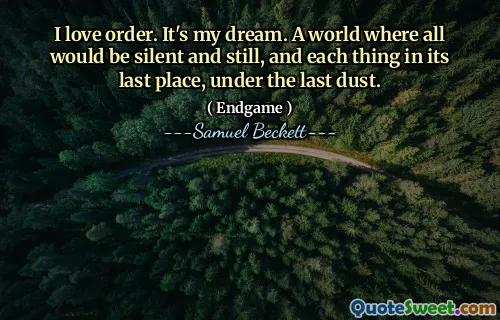Clov: Why this farce, day after day? Hamm: Routine. One never knows. {Pause.} Last night I saw inside my breast. There was a big sore. Clov: Pah! You saw your heart. Hamm: No, it was living. {Pause. Anguished.} Clov! Clov: Yes. Hamm: What's happening? Clov: Something is taking its course. {Pause.} Hamm: Clov! Clov: {impatiently} What is it? Hamm: We're not beginning to ... to ... mean something? Clov: Mean something! You and I, mean something! {Brief laugh.} Ah that's a good one! Hamm: I wonder. {Pause.}
In the dialogue between Clov and Hamm from Samuel Beckett's "Endgame," the characters reflect on their monotonous existence, questioning the purpose of their repetitive routine. Clov expresses confusion about why they engage in the same farcical behavior daily, to which Hamm attributes it to routine, highlighting their uncertain state of being. The conversation takes a deeper turn as Hamm reveals a sense of inner turmoil, symbolized by the metaphor of a sore in his chest, suggesting a struggle with his own existence.
The exchange continues to unravel their existential dread as Clov responds with skepticism to Hamm's concerns about meaning. Hamm's yearning for significance leads to a moment of irony, as Clov laughs at the notion that their lives could hold meaning. This interaction encapsulates the themes of absurdity, despair, and the search for purpose that permeate Beckett's work, illustrating how the two characters grapple with their bleak reality while seeking connection and understanding in their strange world.






